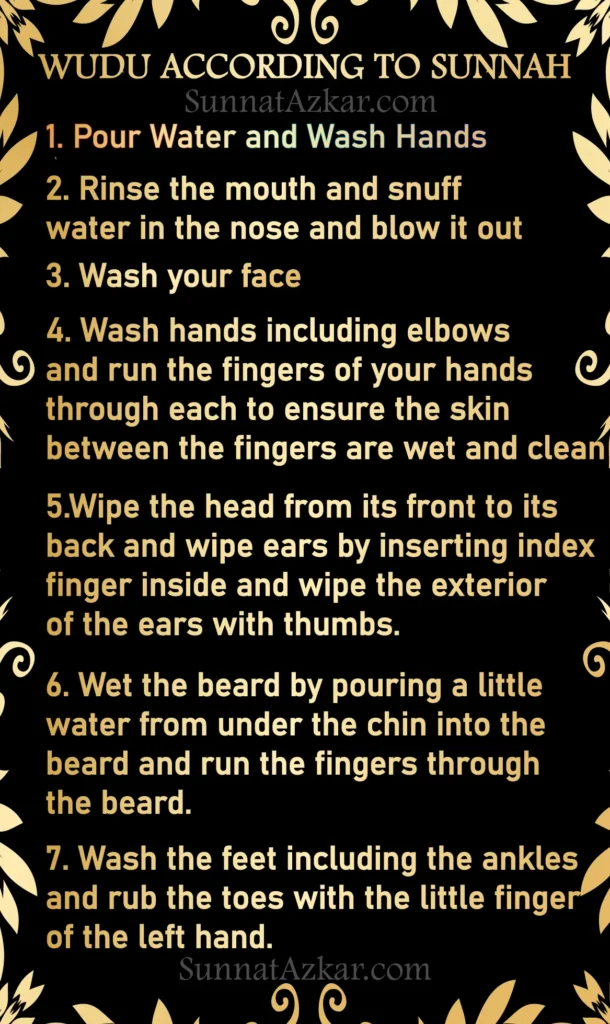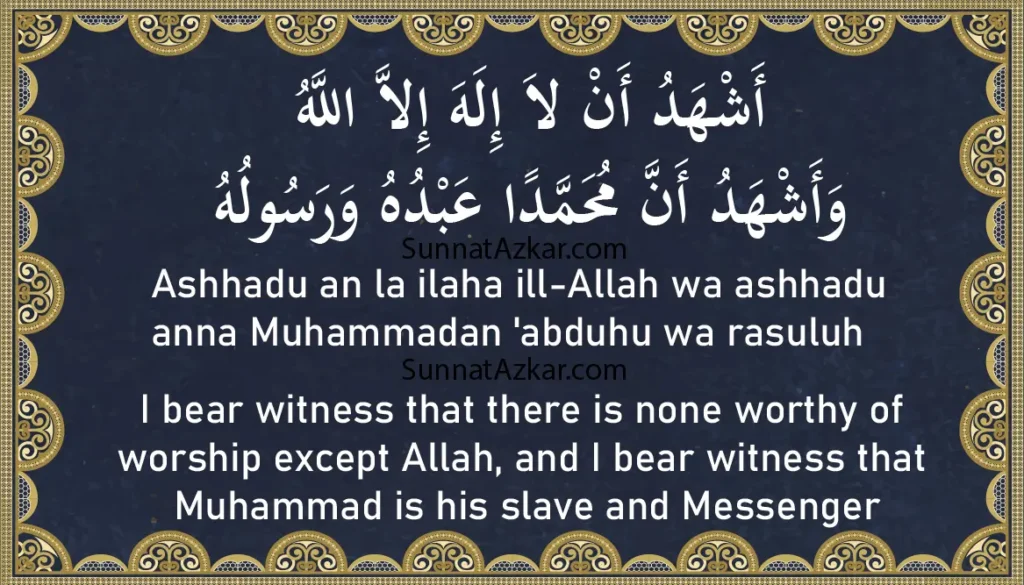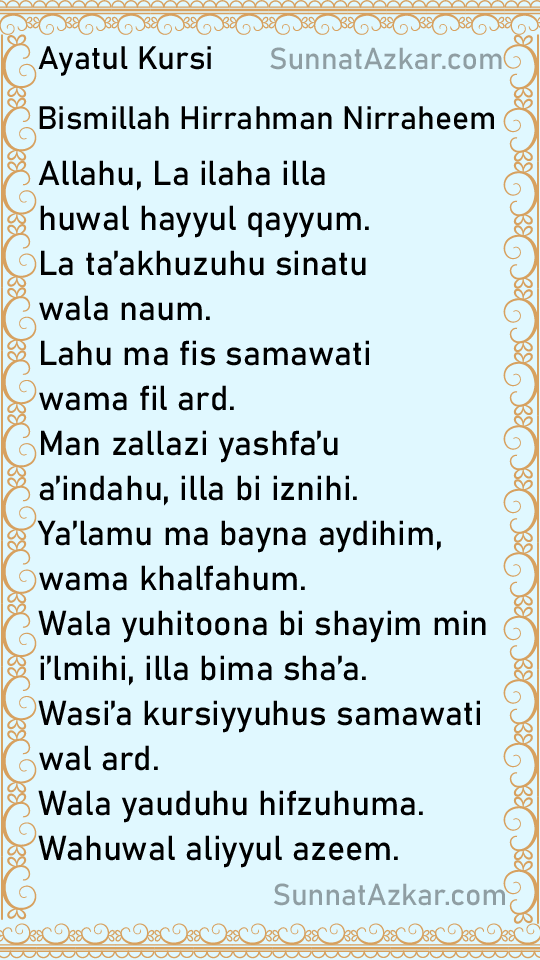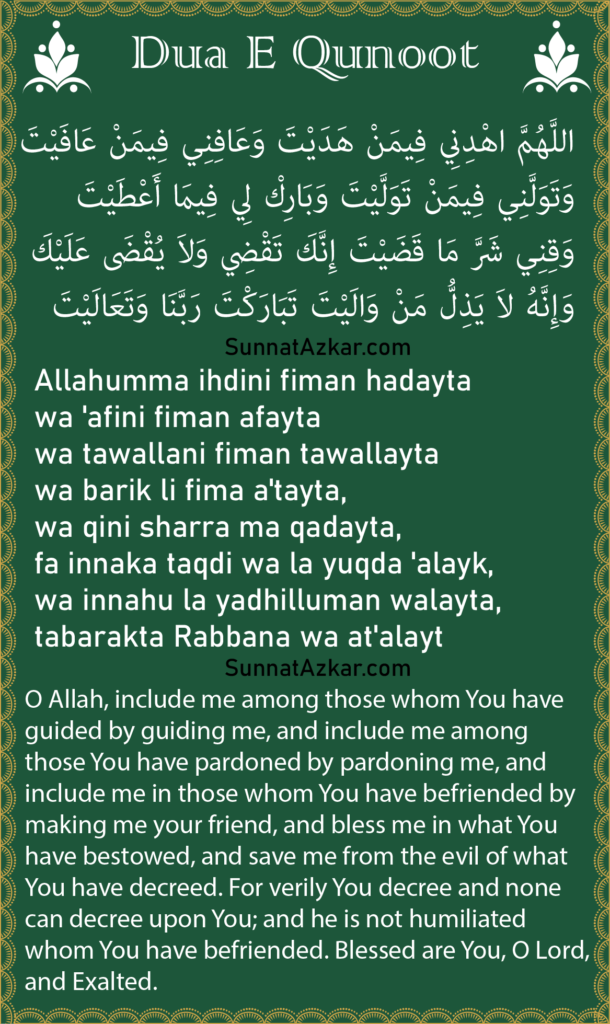In this post, we will learn how to do Wudu according to Sunnah in the light of Sahih Ahadees, before that let us quote some ahadees describing the virtues of performing Wudu.
Table of Contents

Virtues of Wudu
hadees:
It is muttafqun alayh hadees (Imam Bukhari and Imam Muslim both were agreed upon that this hadees is true) mentioned in Sahih Bukhari and Sahih Muslim
Uthman b. ‘Affan reported:
The Messenger of Allah (May peace be upon him) said: He who performed ablution well, his sins would come out from his body, even coming out from under his nails.
Reference : Sahih Muslim 245
Hadees:
After performing the ablution ‘Uthman said, “I am going to tell you a Hadith which I would not have told you, had I not been compelled by a certain Holy Verse. I heard the Prophet (ﷺ) saying, ‘If a man performs ablution perfectly and then offers the compulsory congregational prayer, Allah will forgive his sins committed between that (prayer) and the (next) prayer till he offers it.
the sub narrator ‘Urwa said:
This verse is (Quran 2:159):
إِنَّ ٱلَّذِينَ يَكْتُمُونَ مَآ أَنزَلْنَا مِنَ ٱلْبَيِّنَـٰتِ وَٱلْهُدَىٰ مِنۢ بَعْدِ مَا بَيَّنَّـٰهُ لِلنَّاسِ فِى ٱلْكِتَـٰبِ ۙ أُو۟لَـٰٓئِكَ يَلْعَنُهُمُ ٱللَّهُ وَيَلْعَنُهُمُ ٱللَّـٰعِنُونَ
Those who hide the clear proofs and guidance that We have revealed—after We made it clear for humanity in the Book—will be condemned by Allah and ˹all˺ those who condemn.
Reference : Sahih al-Bukhari 160
Lets see another version of this same hadees in which there is an addition of few words.
Amr b Sa’id b al-As reported:
I was with Uthman, and he called for ablution water and said: I heard Allah’s Messenger (ﷺ) say: When the time for a prescribed prayer comes, if any Muslim performs ablution well and offers his prayer with humility and bowing, it will be an expiation for his past sins, so long as he has not committed a major sin; and this applies for all times.
Reference : Sahih Muslim 228
Brothers and Sisters, it is clear from the above ahadees that major sins are not forgiven by the influence of good deeds, they are forgiven only by repentance.
Whenever you hear that a sin is forgiven by reciting a dua or performing a good deed, it is always a minor sin.
Major sins are never forgiven without repentance. But alas, today we often find major sins in our society as a common thing. Lying, gossip, abusive language, all these are major sins, which will not be forgiven without repentance. Brothers and Sisters, pray to Allah and refrain from sins.
Hadees:
It is an agreed upon hadees (Imam Bukhari and Imam Muslim both were agreed upon that this hadees is true) mentioned in Sahih Bukhari and Sahih Muslim:
Narrated Nu`am Al-Mujmir:
Once I went up the roof of the mosque, along with Abu Huraira. He perform ablution and said, “I heard the Prophet (ﷺ) saying, “On the Day of Resurrection, my followers will be called “Al-Ghurr-ul- Muhajjalun” (their faces, their hands and their feets will be glowing) from the trace of ablution and whoever can increase the area of his radiance should do so (i.e. by performing ablution regularly).’ “
Reference : Sahih al-Bukhari 136
Issue of Musta’mal (used) Water
Abu Huraira said:
When anyone amongst you wakes up from sleep, he must not put his hand in the utensil till he has washed it three times, for he does not know where his hand was during the night.
Reference : Sahih Muslim 278a
The above Hadees prove that if a person needs to do wudu or ghusl then he cannot put his hand directly into the water vessel.
First of all, you have to pour water on your hands and wash them, after that you can dip as much hands in the water vessel as much you have already washed.
If this caution is not applied, and the hand is put directly into the water vessel without washing it first by pouring water over it, all the water that is in the vessel will turn in Musta’mal Water, Water that is used, it has not become unclean but wudu and ghusl can not be performed using this water.
But all this was done in ancient times, today we have water taps installed everywhere, either we are using water taps, or we are doing wudu or ghusl in the shower, so it is not as important for us as it was in the old era.
Dua before Wudu

It was narrated that Abu Sa’eed bin Zaid said:
“The Messenger of Allah said: ‘There is no prayer for one who does not have ablution, and there is no ablution for one who does not mention the Name of Allah (before it).'”
Reference : Sunan Ibn Majah 398
It is clear from above Hadees that if a person wants to perform wudu, it is necessary for him to take the name of Allah before performing Wudu.
For this, the easiest way is to say “Bismillah” (in the name of Allah) before performing Wudu.
بِسْمِ اللَّهِ
Apart from this, any other dua before Wudu has not passed through our eyes, if you know any Dua to recite before Wudu which is proven by Sahih Hadees, then please comment below and tell us and our readers also and it will become a source of endless reward for you.
Sunnah method of Wudu
Below you will find 3 hadees of 3 companions of Allah’s beloved Rasul (ﷺ),Hazrat Ali, Hazrat ‘Uthman, and ‘Abdullah b. Zaid b. ‘Asim al-Ansari in which they have explained the method of performing Wudu as did the Messenger of Allah (ﷺ). They have performed the wudu infront of people at public places to show that how prophet (ﷺ) taught them to perform wudu.
Hadees:
Al-Husain bin ‘Ali said:
“My father ‘Ali called me to bring (water for) Wudu’, so I brought it to him, and he started by washing his hands three times, before putting them into the water. Then he rinsed his mouth three times and sniffed water into his nose and blew it out three times. Then he washed his face three times, then his right hand up to the elbow three times, then his left likewise. Then he wiped his head once then he washed his right foot up to the ankle three times, then the left likewise. Then he stood up and said: ‘Pass me the vessel.’ So I passed the vessel containing the remaining water for his Wudu’ to him, and he drank from it standing up. I was surprised and when he noticed that he said: ‘Do not be surprised, for I saw your father the Prophet (ﷺ) doing,’ referring to his Wudu’ and drinking the leftover water while standing.”
Reference : Sunan an-Nasa’i 95
Hadees:
It was narrated that | Humran bin Aban, the freed slave of `Uthman bin `Affan (رضي الله عنه), said:
I saw `Uthman bin `Affan رضي الله عنه call for water at the door of the mosque. He washed his hands, then he rinsed his mouth, and took water into his nose and blew it out; then he washed his face three times, then he washed his hands up to the elbows three times, then he wiped his head. Then he passed his hands over the outside of his ears, then passed them over his beard, then he washed his feet up to the ankles three times. Then he stood and prayed two rak`ahs, Then he said: I have done wudoo’ for you as I saw the Messenger of Allah (ﷺ) do wudoo’, then I prayed two rak`ahs as I saw him do. When the Messenger of Allah (ﷺ) had finished praying his two rak`ahs, he said: `Whoever does wudoo’ as I have done, then prays two rak`ahs in which he does not let his mind wander, will be forgiven whatever sins came between that and his previous prayer.`
Reference : Musnad Ahmad 489
Hadees:
‘Abdullah b. Zaid b. ‘Asim al-Ansari, who was a Companion (of the Holy Prophet), reported:
It was said to him (by people): Perform for us the ablution (as it was performed) by the Messenger of Allah (way peace be upon him). He (‘Abdullah b. Zaid) called for a vessel (of water), and poured water from it on his hands and washed them three times. Then he inserted his hand (in the vessel) and brought it (water) out, rinsed his mouth and snuffed up water from the palm of one hand doing that three times, He again inserted his hand and brought it out and washed his face three times, then inserted his hand and brought it out and washed each arm up to the elbow twice, then inserted his hand and brought it out and wiped his head both front and back with his hands. He then washed his feet up to the ankles, and then said: This is how Allah’s Messenger (peace be upon him) performed ablution.
Reference : Sahih Muslim 235a
In the above hadees, it is mentioned about washing the hands including the elbows 2 times, but there is another version of this hadees in Sahih Muslim in which it is mentioned about washing the hands including the elbows 3 times, that hadees is given below.
Hadees:
‘Abdullah b. Zaid b. ‘Asim al-Mazini reported:
He saw Allah’s Messenger (ﷺ) perform the ablution. He rinsed his mouth then cleaned his nose, then washed his face three times, then washed his right hand thrice and then the other one, thrice. He then took fresh water and wiped his head and then washed his feet till he cleaned them.
Reference : Sahih Muslim 236
In the light of the above mentioned ahadees of the Messenger of Allah (ﷺ), we have written the method of Wazu that he taught:
Sunnah Method of Performing Wudu:
- pour water and wash hands
- Rinse the mouth and snuff water in the nose and blow it out
- Wash your face
- Wash hands including elbows and run the fingers of your hands through each other to ensure the skin between the fingers are wet and clean
- Wipe the head from its front to its back and wipe ears by inserting index finger inside and wipe the exterior of the ears with thumbs.
- Wet the beard by pouring a little water from under the chin into the beard and run the fingers through the beard.
- Wash the feet including the ankles and rub the toes with the little finger of the left hand.
How many times do you wash in Wudu According to Sunnah
There are ahadees in Sahih Bukhari in which washing the parts of the body once during wudu is recommended by the Messenger of Allah (ﷺ), and washing them twice is also recommended, and washing them three times is also recommended.
Hadees:
Narrated Ibn `Abbas:
The Prophet (ﷺ) performed ablution by washing the body parts only once.
Reference : Sahih al-Bukhari 157
Narrated `Abdullah bin Zaid:
The Prophet (ﷺ) performed ablution by washing the body parts twice.
Reference : Sahih al-Bukhari 158
Narrated Humran:
(the slave of ‘Uthman) I saw ‘Uthman bin ‘Affan asking for a tumbler of water (and when it was brought) he poured water over his hands and washed them thrice and then put his right hand in the water container and rinsed his mouth, washed his nose by putting water in it and then blowing it out. then he washed his face and forearms up to the elbows thrice, passed his wet hands over his head and washed his feet up to the ankles thrice. Then he said, “Allah’s Messenger (ﷺ) said ‘If anyone performs ablution like that of mine and offers a two-rak’at prayer during which he does not think of anything else (not related to the present prayer) then his past sins will be forgiven.’ “
Reference : Sahih al-Bukhari 159
By going through ahadees mentioned above, we can say that it is permissible to wash your body parts once, twice or three times in wudu but other ahadees of wudu show us that majority of companions of Prophet Muhammad (ﷺ) has chosen to wash their body parts three times during the Wudu.
What caution to take during Wudu?
Washing of Heels
Washing the heels thoroughly is so important in Wudu that the Messenger of Allah (ﷺ) commanded in a loud voice to wash the heels thoroughly.
Hadees:
Narrated `Abdullah bin `Amr:
The Prophet (ﷺ) remained behind us on a journey. He joined us while we were performing ablution for the `Asr prayer which was overdue and we were just passing wet hands over our feet (not washing them thoroughly) so he addressed us in a loud voice saying twice , “Save your heels from the fire.”
Reference : Sahih al-Bukhari 163
Wetting the Beard
Wetting beard with water during wudu and running fingers through beard is the Sunnah of the Prophet (ﷺ). You can read the hadees about it given below.
Hadees:
Narrated Anas ibn Malik:
Whenever the Messenger of Allah (ﷺ) performed ablution, he took a handful of water, and, putting it under his chin, made it go through his beard, saying: Thus did my Lord command me.
Reference : Sunan Abi Dawud 145
Hadees:
It was narrated from ‘Uthman that:
The Messenger of Allah performed ablution and ran his fingers through his beard.
Reference : Sunan Ibn Majah 430
Khilal of Fingers
Khilal of fingers means to move your fingers between each other in such a way that the space between them becomes perfectly wet and clean.
By reading the following Hadees, you will know how the Messenger of Allah (ﷺ) used to do khilal of fingers of his hands and his toes.
Hadees:
Narrated Laqit bin Sabra (rad):
Allah’s Mesenger (ﷺ) said: “Perform a perfect Wudu run (your fingers) through the fingers of the hands and the toes, and if not fasting, sniff water up well inside the nose”. [Reported by Al-Arba’a and Ibn Khuzaima graded it Sahih].
Reference : Bulugh al-Maram 39
Hadees:
Narrated Al-Mustawrid ibn Shaddad:
I saw the Messenger of Allah (ﷺ) rubbing his toes with his little finger when he performed ablution.
Reference : Sunan Abi Dawud 148
Masah of Ears
To do Masah of something means to wipe it clean.
There are ahadees in Sunan Ibn Majah, Jami at-Tirmidhi, Sunan Nasai that whenever the Prophet (ﷺ) wiped his head, he also wiped his ears inside and the outside. From this it becomes clear that wiping the ear is also included in wiping the head.
Hadees:
It was narrated from Miqdam bin Ma’dikarib that:
The Messenger of Allah performed ablution and he wiped his head and his ears, inside and out.
Reference : Sunan Ibn Majah 442
One thing to be noted here is that wiping your head and ears is established in the Sahih ahadees from the Prophet (ﷺ), but wiping your neck is not established in any Sahih hadees, so when you have to do ablution according to the Sunnah of the Prophet Muhammad (ﷺ) then you should avoid wiping your neck.
Cleaning the Nose
A Sahih Hadees has been quoted below in which Hazrat Ali has taught that to clean the nose, water has to be snuffed from the nose and after holding the nose with the left hand, all the water has to be blown out.
Hadees:
It was narrated that ‘Ali called for (water for) Wudu’, then he rinsed his mouth and nose, and he sniffed up water and blew it out using his left hand. He did that three times, then he said:
“This is how the Prophet of Allah (ﷺ) purified himself.”
Reference : Sunan an-Nasa’i 91
Dua after Wudu

Earlier we have already learnt what to say before Wudu, now lets learn the Dua to be recited after performing Wudu.
Here we will mention only one Dua after Wudu because only 3 supplications after Wudu are found in the Sahih ahadees of the Prophet of Allah (ﷺ). And we have already included all the three supplications in one of our posts, if you are interested then you can read those dua by clicking here.
Hadees:
It was narrated that ‘Umar bin Al-Khattab said:
“The Messenger of Allah (ﷺ) said: ‘Whoever performs Wudu’ and does it well, then says:
أَشْهَدُ أَنْ لاَ إِلَهَ إِلاَّ اللَّهُ وَأَشْهَدُ أَنَّ مُحَمَّدًا عَبْدُهُ وَرَسُولُهُ
Ashhadu an la ilaha ill-Allah was ashhadu anna Muhammadan ‘abduhu wa rasuluh
I bear witness that there is none worthy of worship except Allah, and I bear witness that Muhammad is his slave and Messenger
eight gates of Paradise will be opened for him, and he may enter through whichever one he wishes.'”
Reference : Sunan an-Nasa’i 148
Share the Blessings: Share SunnatAzkar.com with your family and friends
We hope that in this post we have explained the method of performing Wudu according to Sunnah perfectly in the light of the true Ahadees of the Prophet Muhammad (ﷺ).
We request you to share it with your friends, relatives and loved ones also so that it becomes a source of endless reward for you in this world and hereafter.
In a world filled with information, let’s make sure the knowledge that truly matters reaches in every corner. Spread the word about SunnatAzkar.com, where faith meets authenticity.
May your sharing be a source of guidance and blessings for all, and may your efforts be rewarded abundantly by Allah The Almighty.












